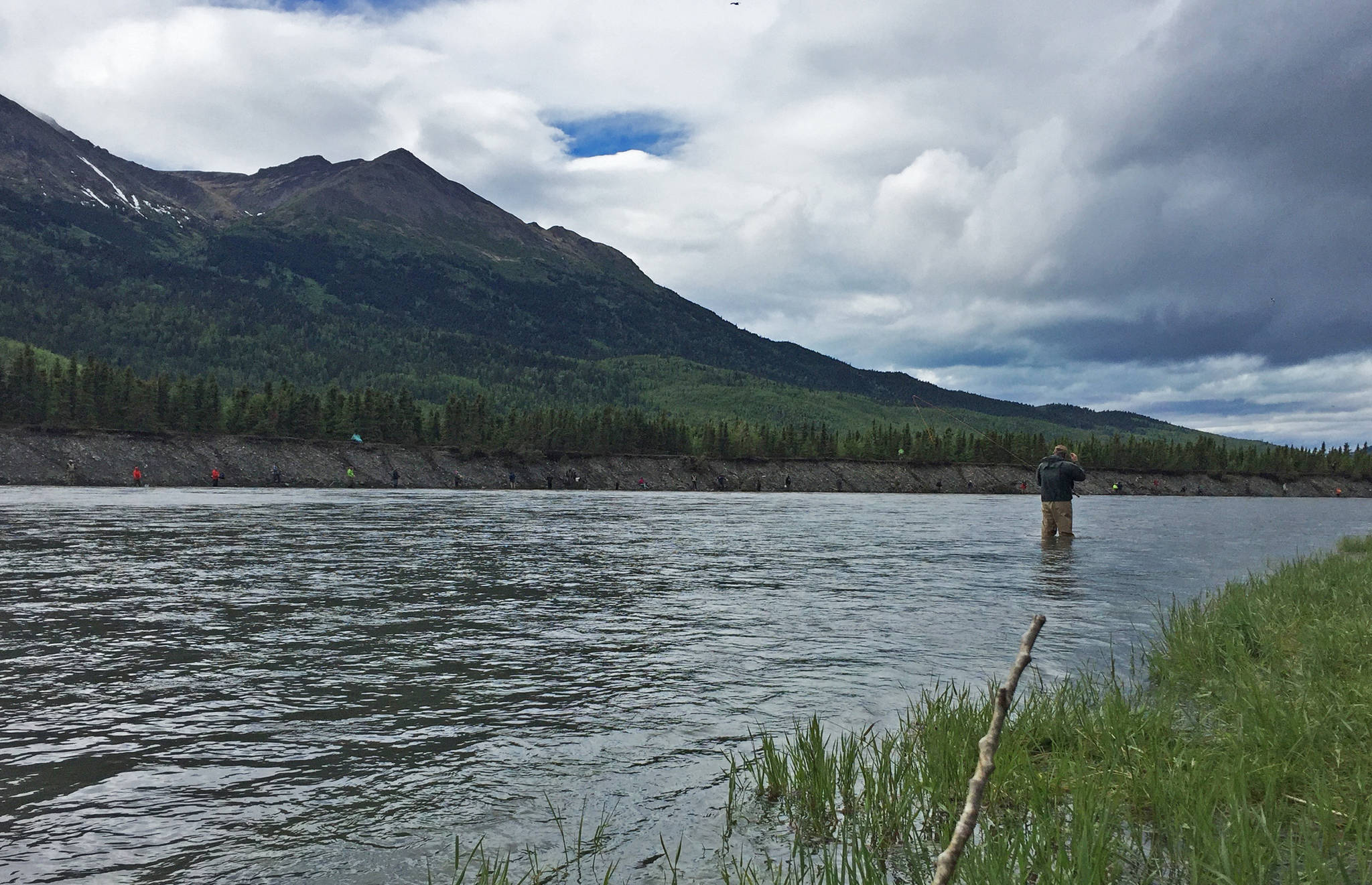With a holiday smack dab in the middle of the week, warm temperatures and sun predicted through Saturday and fish in the rivers, anglers will be headed out in earnest on the Kenai Peninsula this week.
A key spot will be the confluence of the Kenai and the Russian rivers, where the sockeye salmon are showing up in healthy numbers. The Alaska Department of Fish and Game doubled the bag and possession limit on the Russian River and a section of the mainstem upper Kenai River in an emergency order Monday, to take effect at 12:01 a.m. Tuesday, lasting through July 14. As of Tuesday, the bag limit is six fish with 12 in possession.
As of Monday, 34,391 sockeye salmon had passed the weir on Lower Russian Lake, ahead of the 27,594 that had passed the weir on the same date in 2017. With average run timing, about 70 percent of the run had passed the weir as of July 1, according to the emergency order, and Fish and Game estimates that the run will exceed the escapement limit of 22,000–42,000 sockeye.
King salmon fishing also opened back up on the lower Kenai River on Sunday, from a marker 300 yards downstream of the confluence of Slikok Creek to the mouth of the river. There’s no bait and fishing is a little slow, but some anglers are catching kings, said Scott Miller, owner of Trustworthy Hardware and Fishing in Soldotna.
“I think there’s fish in,” he said. “It’s definitely worth going out there and taking a look.”
The warm weather doesn’t usually make for good king fishing, and the water quality in the lower river isn’t the best right now, Miller said. Fishing early in the morning and on the incoming tides may be better, he said. Some of the anglers were fishing with plugs, Miller said, but he had luck with cheaters with kings.
Fish and Game’s counts for late-run kings are only two days in and counted 115 kings on Sunday and 163 kings on Monday, for a total of 278. To the south, the restrictions on king fishing on the Kasilof River expired June 30.
There are sockeye coming into the Kasilof and Kenai rivers now, too. As of Tuesday, 46,554 sockeye had passed the sonar on the Kasilof since June 15. On the Kenai, where managers began counting sockeye Sunday, 5,662 sockeye have passed the sonar, according to Fish and Game’s online counts.
There’s lots of fishing going on out in the salt water, too. Halibut fishing is heating up, and anglers are trolling for king salmon in the marine water as well. Halibut charter captain Mike Crawford said halibut fishing has been decent so far this year.
“Most days with very few exceptions, most halibut charters are limiting on their fish,” he said. “Most days, it’s not a problem of are we going to catch enough halibut, it’s are we going to catch a bigger size halibut that people are happy with.”
Lingcod fishing also opened Sunday. Though he doesn’t guide for them, Crawford said he went fishing for lingcod in Prince William Sound, where fishing was tough.
“I’ve been there where we limit out in minutes, and it took hours,” he said. “I don’t think there’s as many of them as there used to be.”
The Board of Fisheries reduced the bag limit for lingcod in Prince William Sound to one per day with one in possession with a minimum length of 35 inches with the head attached or 28 inches with the head removed. In Lower Cook Inlet, the bag and possession limit is two lingcod. However, anglers typically have to go much further to fish for lingcod out of Homer — typically around the point south of Kachemak Bay toward the Gulf of Alaska.
Anglers have reported more young lingcod this year, according to the Lower Cook Inlet sportfishing report issued Tuesday.
“This is encouraging news for the lingcod fishery,” the report states. “Please remember to carefully release all undersized lingcod and to never use a gaff on a fish intended to be released.”
Anglers at the Russian River are reminded to remove fish carcasses whole or gutted and gilled from the Russian River clear water. Anglers who choose to clean their fish at the river should chop the carcasses into small pieces ad thorw the pieces into deep, flowing waters and to keep all personal belongings — including stringers of fish — close as well as respecting the riverbank restoration projects.
Reach Elizabeth Earl at eearl@peninsulaclarion.com.

